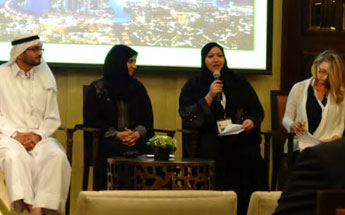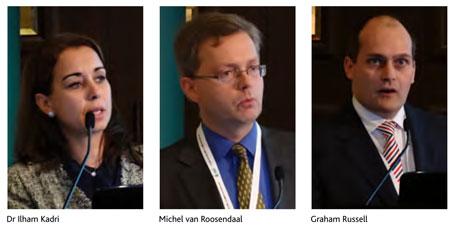Discussions at the first Emirates Green Building Council Congress established that sustainability is a holistic concept, and that in order for it to become viable and effective, all sectors of society need to come together and contribute to the advancement of the cause. We bring you Part II of our report. Report by Jerome Sanchez
Discussions at the first Emirates Green Building Council Congress established that sustainability is a holistic concept, and that in order for it to become viable and effective, all sectors of society need to come together and contribute to the advancement of the cause. We bring you Part II of our report. Report by Jerome Sanchez

The second half of the first Emirates Green Building Council Congress, held on November 27 and 28, 2012, featured panel discussions and presentations involving personalities from the industry, non-governmental organisations and academia. The discussions focused on how these sectors of society could contribute towards promoting sustainable development and strategies to foster energy efficiency and encourage sustainability.
After the paper presentation by Charles Blaschke (for details on the first half of the event, see the report featured in our January 2013 issue), came a panel discussion on radical sustainable innovation, entitled “Creating Opportunities for a New Vision”, moderated by Dr Robert Cooke, EGBC Technical Committee Coordinator. Steven Pratt, Regional Director for Middle East, InterfaceFlor; Yousif Al Zarouni, Senior Manager of Strategy and Delivery, Bee’ah; Ali Al Suwaidi, Vice President, Middle East Facilities Management Association; and Khaled Bushnaq, CEO of EMS participated in the discussion.
The panel discussion focused on innovation needed to reduce energy consumption, halve the carbon intensity of fuel sources, increase energy efficiency and promote sustainability of energy sources, while maintaining the quality of life in the UAE and in the region in general. “Change needs to happen, we need innovation,” said Cooke. “Change needs to come through regulator change, technical and technological change, and social change.… We shouldn’t underestimate the power of cultures and the power of society, and the need to engage that society.”
Cooke directed the discussion by asking the panelists to share examples of changes they were experiencing within the market they were working in.

(L-R) Adnan Sharafi, Habiba Al Marashi, Dr Hanan Taleb and Tamara Wither
The panel discussion was followed by presentations on high performance buildings from the event’s sponsors. The speakers were Dr Ilham Kadri, General Manager, Dow Advanced Materials; Michel van Roosendaal, Vice President, Services and Contracting, EMEIA, Trane and Thermo King; Graham Russell, CEO, CEMEX USA and GCC; and Todd Jarvis, Global Marketing Director, Shaw Contract Group.
In her presentation, Dr Kadri highlighted that Dow Advanced Materials had already started to practice sustainability in its own facilities and factories around the world. She added that her company upheld sustainability through innovation and research and development. “We would like to see more innovations, more products, and more solutions come out of the pipeline with the best sustainability profile,” she said.
Van Roosendaal focused on the best practices in the maintenance of buildings to increase their energy efficiency and reduce their power consumption. He said that the performance of a building could be gauged through its safety and comfort, business performance, reliability, and efficiency. “In Europe, by 2020, new buildings will have to be at near zero emissions, near zero energy consumption,” added Van Roosendaal. “For us, at Trane, it’s a big change, because it’s not just a matter of selling as many choices as you can and keeping the set point as low as you can. It’s about finding a balance and how I can operate in a sustainable way in such a way that I have a high performance building.”
Summing up his talk, Van Roosendaal, emphasising that his company found most of the opportunities in existing buildings, said, “You have more of an impact from a poorly designed building operated and maintained effectively, than a well-designed building with poor operating and maintenance practices.”
Russell spoke about his company’s sustainability efforts across its entire product range. He also spoke about how the regional and the global operations of CEMEX complement each other. In addition, he also discussed about CEMEX’s guiding pillars in its operations, which he said were collaboration, leadership and integrity. He also briefly presented some of CEMEX’s local projects, including Dubai Mall, Mirdif City Center and the Dubai Airport Terminal 3. He ended his presentation by showing some of the company’s new products that, according to him, directly contribute to sustainability.
Using the Golden Gate Bridge as a case-in point, Jarvis introduced the notion of building “something that will last forever”. Speaking about Shaw’s effort to make products that would “last forever”, he highlighted that his company was the first in the world to be awarded the “cradle-to-cradle” certification. He said that this was achieved through the use of healthy materials in the process, the efficient use of water and energy, the consideration of social responsibility in the manufacturing process, and the production of highly recyclable products. “So, I like to encourage you, as you continue to build the UAE, think about this concept of “forever”, and how you continue your unbelievable, amazing growth here, with this type of “forever” concept,” he concluded.
 The next part of the Congress comprised another panel discussion on the role of society in sustainability. The discussion was moderated by Praseeda Nair, Editor of BGreen. Panelists included Adnan Sharafi, Chairman, Emirates Green Building Council; Habiba Al Marashi, Founder and Chairperson, Emirates Environmental Group; Tamara Wither, CSR Program Manager, Emirates Wildlife Society-WWF; and Dr Hanan Taleb, Assistant Professor, British University in Dubai.
The next part of the Congress comprised another panel discussion on the role of society in sustainability. The discussion was moderated by Praseeda Nair, Editor of BGreen. Panelists included Adnan Sharafi, Chairman, Emirates Green Building Council; Habiba Al Marashi, Founder and Chairperson, Emirates Environmental Group; Tamara Wither, CSR Program Manager, Emirates Wildlife Society-WWF; and Dr Hanan Taleb, Assistant Professor, British University in Dubai.
The discussion focused on the role of non-governmental organisations (NGOs) in forming a more informed society.
“Sustainability is a holistic concept. It is not something that you can disintegrate and only one sector of the society can deal with it. It can only be effective when all sectors of the society come together, each in their own speciality, to want to deal with it,” said Al Marashi. She added that in, her opinion, the most important sector of society was the civil society. “They are the ones who [act] as the glue that binds all these together, and brings the community at large on to the platform, and mobilise it,” she said. She emphasised that the student community, in her opinion, was the future and that they really needed to be involved in the efforts that were being undertaken today. “If you want to have the continuity, the assertiveness, and the sustainability of anything that you are doing, you have to take the next generation and train them,” she concluded.
Withers noted that there was a remarkable demand for environmental education initiatives across the UAE. “If we raise awareness in the schools, then we will see a change, not only in how they live their lives, but they [students] can also influence their parents. I think, through all of our organisations, that’s an important element and something that we’ll continue to do more of in the future,” she added.
“People are the most important resources for sustainable development,” Taleb said, commencing her segment of the panel discussion. Taleb observed that in the past, the academe used to work in isolation and that it was not aware of what was happening in real life. As a member of an educational institution, she said, it was therefore important for her to engage students in real-life situations. In this regard, she believed that at present there was an intensified effort to collaborate and cooperate with local entities to be informed of what pertinent research topics they could undertake. “The designs or the projects that we are doing in the British University in Dubai are mainly connected to the Dubai climate, UAE climate, and the social needs that we need to address in our design. So, it is very important to connect our students to the local environment and address the people’s needs,” she added.
The first day of the Congress was capped by presentations of case studies of green buildings. Christopher Charles Benninger, Professor and Principal Architect, Suzlon Energy, spoke about the new Suzlon Energy Building in Pune, India. Eman Al Madani, CSR Executive, Dubai Chamber of Commerce and Industry, presented retrofits and modifications adopted for the Dubai Chamber of Commerce building in Dubai.
The second day of the Emirates Green Building Council Congress featured workshops on passive cooling strategies, Estidama, Dubai building codes, and LEED in the Middle East.
Copyright © 2006-2025 - CPI Industry. All rights reserved.